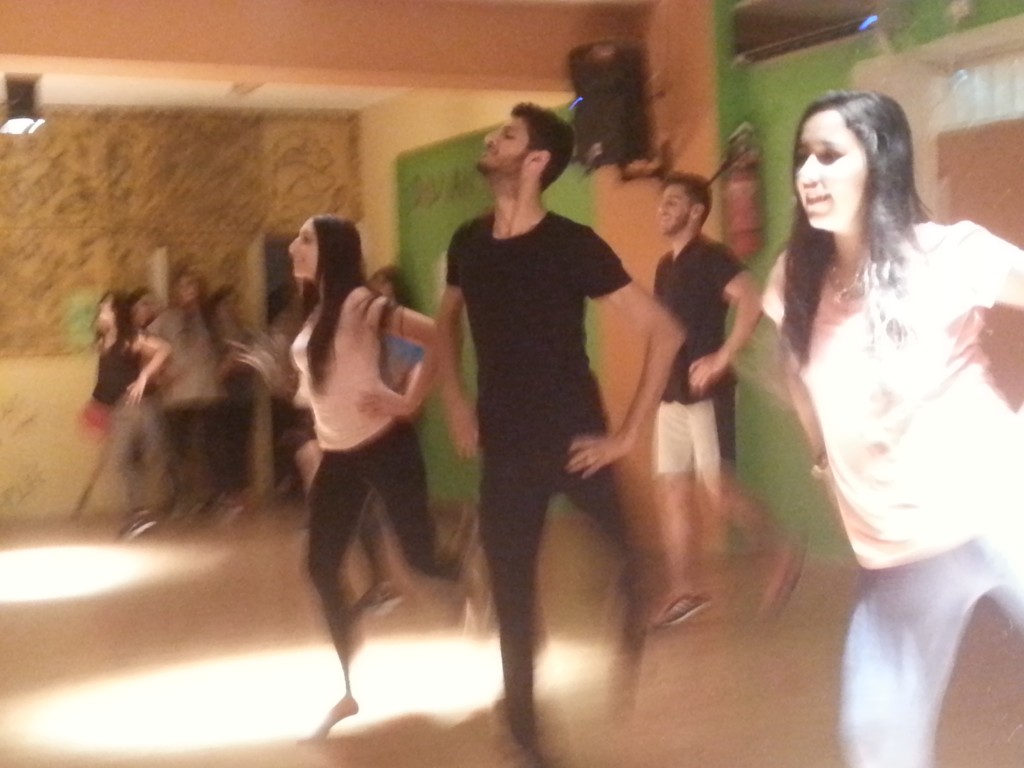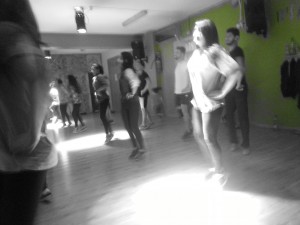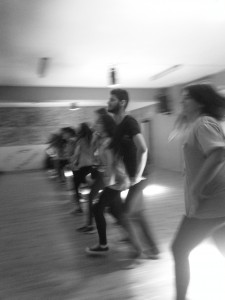Dabke and the liberation of dance
By Khaled Diab
“Dance is resistance. It's the most refined way for us, the Palestinian people, to express our cause… Dance is a form of liberation.”

Photo: ©Khaled Diab
Thursday 6 August 2015
Boys don't dance. That was the notion Hanna Tams, a 20-year-old Palestinian from East Jerusalem, had grown up with. “Dancing is seen as something girly,” the young dancer explained. “When a guy dances, they feel he is feminine, not masculine.”
“But you don't dance because you're a man or a woman. You dance because you have something inside you want to express,” he added, the words almost dancing out of his eyes.
Hanna discovered by chance that he had something to express with his body. “I saw my sister learning to dance… and I liked the idea,” he told me. “I used to go home and do everything she did in her class. I then went to an institute and began to learn.”
Hanna's sister's dance lessons at Ouf, a Jerusalem-based dance troupe, ignited something inside of him he never new existed. His love of movement developed and he decided to start taking dancing lessons too. There, he felt there was a huge gap in what Palestinian dance troupes were practicing, focusing mostly on dabka, with little or no attention to other forms of dance, or the blending of traditional and contemporary styles.
The young dancer says this missing element was the reason behind his decision to set up his fusion dabka dance company, Douban. “I felt there was a huge gap in Palestinian society,” he noted. “Most of the groups we have here do dabka, and not ballet or contemporary dance.”

I observed this synthesis of styles on display during a dizzying, non-stop rehearsal in which the dancers blended dabka with ballet, flamenco, jazz, hip-hop and other forms of modern dance.
Segments of the community had moral objections. “When it came to ballet, some rejected the idea that Palestinian girls should perform dances of this kind,” he added. Some of his male dancers were also reluctant to dance ballet. “They didn't see any benefit to it and they didn't think it was right for guys to dance like that,” Hanna points out. “Now this has changed and they enjoy it.”
Douban's experimental style did not, at first, go down well with traditionalists who regarded dabka as an integral feature of Palestine's threatened national identity and a vital component of its traditions. “We faced criticism that we were distorting the dabka and altering our heritage,” recalls Hanna. “But with time, these perceptions changed, as audiences began to interact with our performances and understand better what our work was about.”
Though he is not a dabka puritan, Hanna regards his innovative approach to tradition as an expression of subversive defiance, renewal and reform. “Dance is resistance,” he asserts. “It's the most refined way for us, the Palestinian people, to express our cause to the outside world.”
Over and above this, Hanna see dance as a powerful means of freeing the individual. “Dance is a form of liberation for the soul and mind,” he explains. Though dance manifests itself physically, to Hanna, it actually has little to do with the body.

“Dance is linked to the mind. And your mind is what moves your body,” he describes. “As Hanna, I cannot just be a technical dancer, I cannot just move my body. I need to have an internal purpose.”
And this internal purpose comes through in many of the dances he composes and choreographs for the group. Among the dances with a social message which I observed was one which explored what Hanna perceives as the gentle-yet-tough identity of the Palestinian woman and another which expressed the voicelessness felt by Palestinians.
All of Hanna's dreams dance around his art. He had won an undergraduate scholarship to study dance in London. However, his mother vetoed the idea out of concern for his future. “My mum rejected it because she was afraid that society would look at me in the wrong way,” he recalls.
Surprisingly, his businessman father was more supportive. “My dad's dream was to become a professional tennis player,” Hanna says. “He felt hard-done by because his family did not help develop his talent, and he didn't want to repeat the same error with me.”
Now both his parents are on the same line vis-à-vis their son's dreams. His mother even co-manages, along with a friend, Douban. Hanna sees his current course of business studies as a way to make his career choice more financially viable.
But once he is done at Birzeit university, the young dancer intends to follow his inner groove to London to become a master – perhaps even a PhD – of dance.


Wonderful piece. Thank you for writing it.